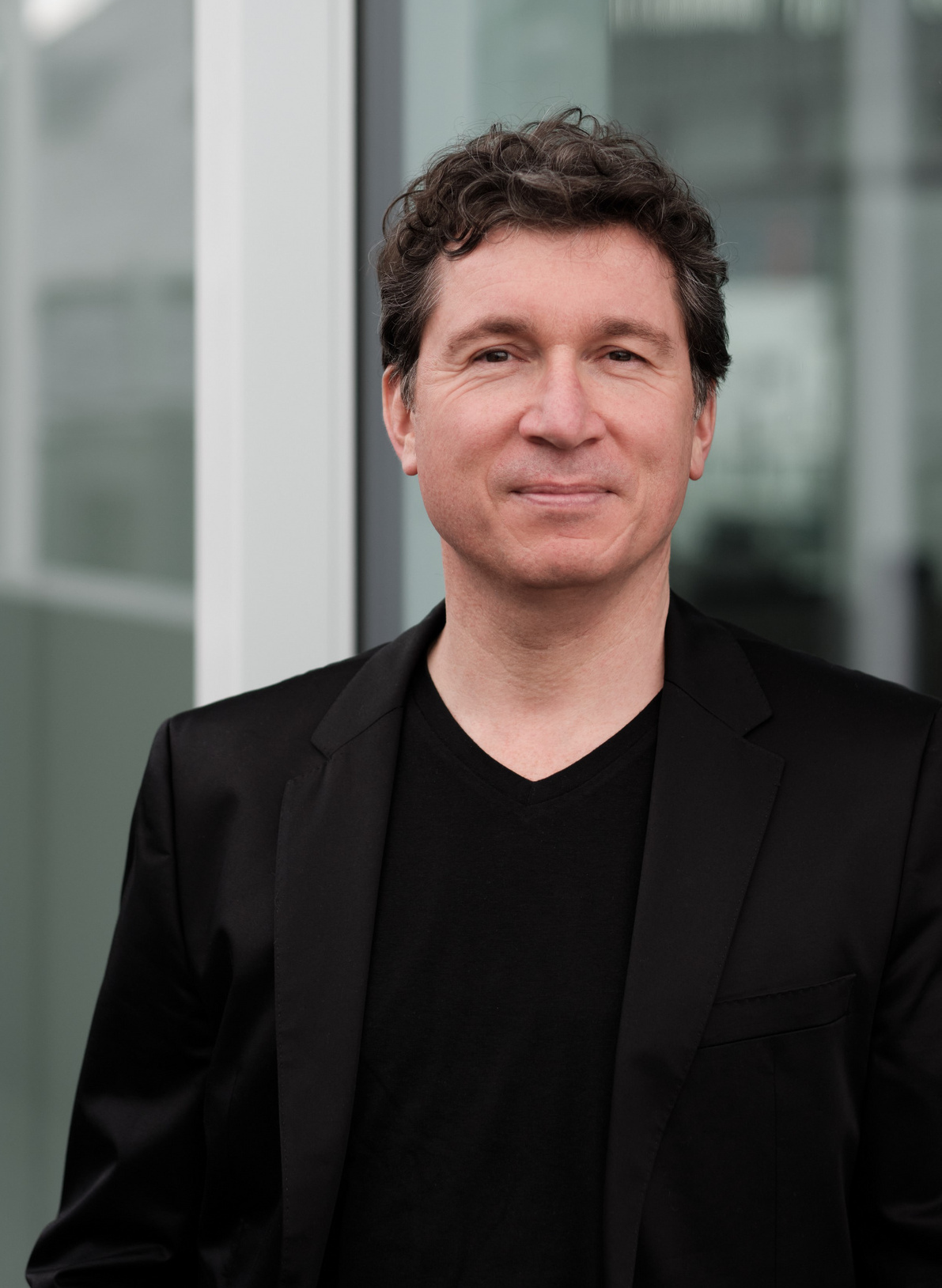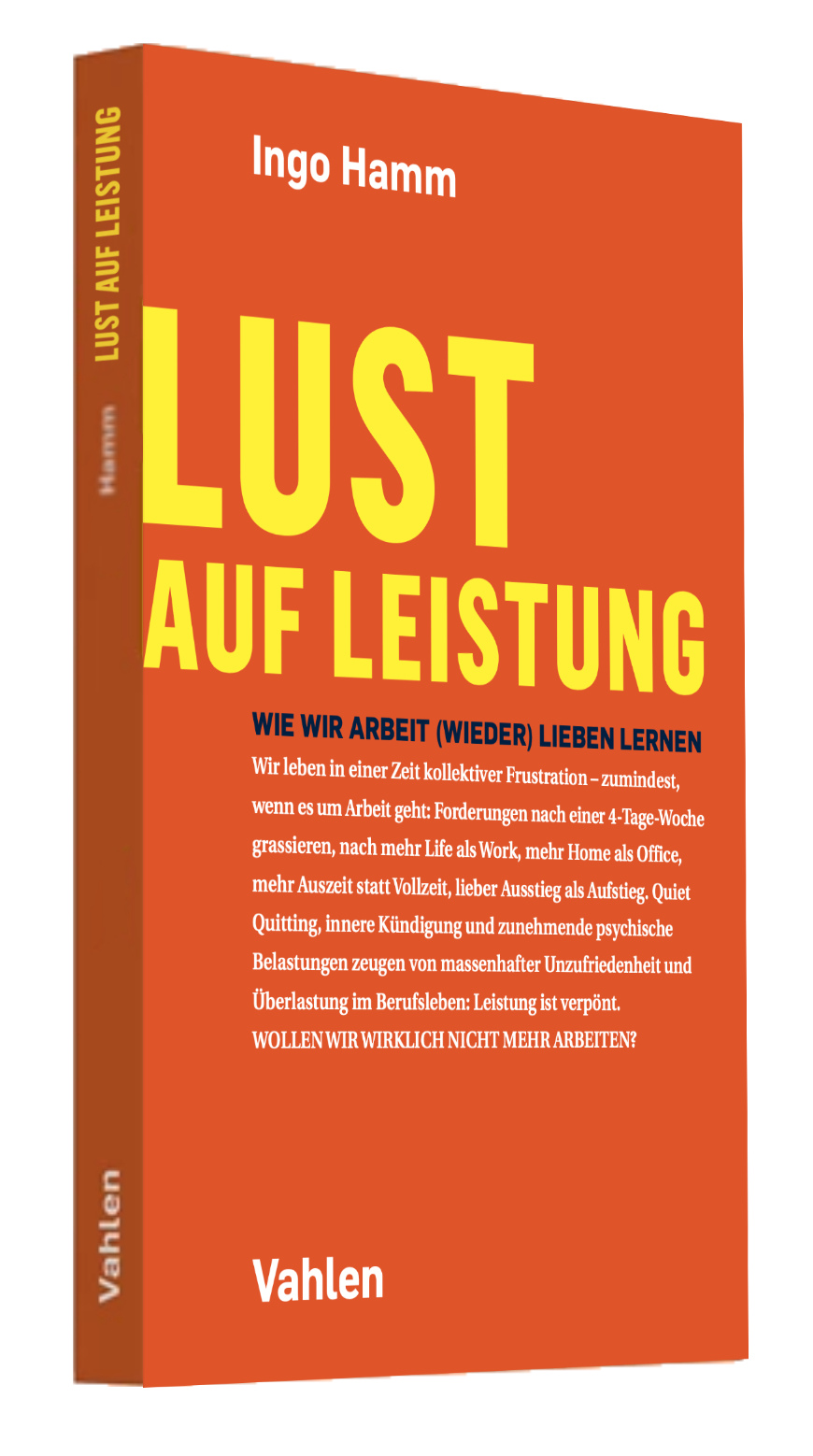New Work and motivation

Business psychologist Ingo Hamm on fulfilling work in times of digitalisation, the art of choosing a profession – and what we can learn jobwise from the UEFA European Championship.
Interview: Kilian Kirchgeßner, 21.5.2024
impact: Professor Hamm, the title of your new book – “Lust auf Leistung” (“The Pleasure of Performance”) – almost sounds anachronistic at a time when many people are calling for the 35-hour working week. Why are you going against the trend?
Professor Ingo Hamm: (laughs) Because sparking people’s enthusiasm for work again is something close to my heart. But we must be careful: if you were to look at it from a purely economic perspective – “We all need to work more again” – then that would indeed be anachronistic.
impact: From which perspective can we look at it, then, if not from an economic one?
Hamm: I’m a psychologist. And we’re all noticing that our society has many problems; everyone is experiencing a lot of dysfunctionalities in their everyday lives and that some things are not going as they should. And I’m firmly convinced that we shouldn’t wait for someone to fix these problems for us. We can’t just gripe, whinge and protest. On the contrary: everyone has the possibility, as well as the responsibility, to do their bit. This is how we can get on top of the problems.
impact: Now you’ve chosen the social perspective. But your book is also very much about the psychological significance of work...
Hamm: …and that is extremely archaic. My perception of my own effectiveness is connected to me seeing what I’m capable of achieving. That in the evening I can see what I’ve created with my own hands. Because less and less people are able to do this today, we and our modern society find ourselves in an effectiveness crisis, whose roots go back decades to automation, and in our current times digitalisation has now been added to the mix. During the coronavirus pandemic, work became incredibly flexible, and at the beginning we all welcomed this: we think that working from home gives us additional freedom and free time. In fact, it has led above all to workplace loneliness. Three phenomena are currently having a combined effect: loss of effectiveness, social identity crisis and workplace loneliness. And many people are asking themselves: “Damn, what is actually the point of my job?”
impact: Just a second: futurologists have predicted that robots and artificial intelligence will at some point take over all the work and we humans will be superfluous as far as productivity is concerned. Shouldn’t we be looking forward to this prospect?
Hamm: In my opinion, a work-free society that manages somehow to finance itself is a political utopia. For psychological reasons, I don’t think it makes any sense whatsoever. We humans need to experience effectiveness. We can’t just lie in a hammock all day and slurp cocktails. No one finds that satisfying in the long run.
About Ingo Hamm
Ingo Hamm is Professor for Business Psychology at Darmstadt University of Applied Sciences. After studying psychology and economics, he initially worked in management consulting and then for a large corporation, where he was in charge of international projects. In 2015, he switched to research and teaching. His research focuses on the future of work, among other topics. His most recent publication is the book “Lust auf Leistung – Wie wir Arbeit (wieder) lieben lernen” (“The Pleasure of Performance – How We Can Learn To Love Work (Again)”.
impact: Alienation from one’s own work has been a topic of discussion ever since Henry Ford introduced the assembly line. Why have you published your book now, a good 100 years later?
Hamm: The interesting thing is that the impact of automation has been mitigated over and over again in the past decades, precisely because of such debates – through the introduction of group work, semi-autonomous working groups and other findings from occupational psychology. So people indeed recognised early on that automation leads to psychological unhappiness. Interestingly, it’s precisely these efforts to achieve a balance that are virtually non-existent in the digital realm: many hail the fact that AI makes work easier, but they forget that people need to experience the effectiveness we’ve already talked about – and which digitalisation often takes away from them. But there is another difference between automation and digitalisation.
impact: Namely?
Hamm: Large companies already started offsetting the negative effects of automation over a hundred years ago. Just think of leisure amenities for staff: corporate sports clubs, party rooms and community centres or even the former railroaders’ gardens that have since evolved into colonies of allotments. The motivation behind this was to strengthen community spirit and create a sense of purpose. Hardly anything comparable is happening now in the digital revolution.
impact: You use the word “worker’s pride” in your book. Can we still take any pride at all in the results of our own work in a society based on the division of labour – or wouldn’t we all have to become carpenters with our own little workshops?
Hamm: Worker’s pride isn’t reserved solely for craftsmen and craftswomen. Nurses and doctors, for example, often take pride in their work – despite the extremely hard daily routine in the hospital and endlessly long shifts – because they’re making a difference and healing people. And others take pride in what they do in their free time, such as building a tree house for children, or working as a volunteer in disaster relief, or lending a hand at the local anglers’ club.
impact: But that’s exactly what you warn against in your book: trying to shift a sense of fulfilment to our private lives and just sitting out our hours in the office.
Hamm: Ideally, it’s our work that gives us a sense of fulfilment, you’re right. The first step in that direction is self-awareness: What are my natural skills? Everyone has some kind of primal activity that they do well. There used to be an excellent careers service where such a diagnosis came first – self-exploration of what you were good at as a child, what you enjoyed doing. Is it something manual or a sport? Is it dealing with people? Psychology defines 17 basic types. Asking yourself carefully before deciding on a specific study programme, training course or career is incredibly important.
impact: This advice mainly concerns young people at the start of their careers. But what happens if someone in their 40s or 50s realises they’ve ended up in the wrong job?
Hamm: There are these fanciful stories of a frustrated top manager who throws in the towel and finds fulfilment as a shepherdess with her own flock – such stories fascinate an amazing number of people. But only very few have a sufficiently thick financial cushion that they can afford to make such a radical caesura. That’s why I strongly advise against chasing such fantasies.
impact: Resignation is better?
Hamm: No, that’s not the alternative! Firstly, if they haven’t done it yet, everyone should analyse what they’re actually good at. A second step could then be what is known as “job crafting”: look together with your employer at how you can tweak your existing job so that it suits you better. What can you change in your daily routine, in your work processes, in the responsibilities assigned to you? In other words, it’s about aligning your job more closely with your own needs. In many cases, it’s possible to achieve an incredible amount without taking radical steps. Studies corroborate very convincingly how helpful this job crafting can be.
impact: You started your career with management consultants McKinsey, who are not exactly renowned for their 35-hour working week. What did you learn about work there?
Hamm: I can see a parallel with competitive athletes: they can only perform at their best if they train hard, show perseverance, are willing to learn and sometimes take detours. When the UEFA European Championship starts in the next days, we will experience again how much identity, pride and pleasure we can derive from such top performances.
impact: You speak of flow experiences.
Hamm: Exactly. It’s about being totally absorbed in an activity. Many people get this feeling from sport, for example when they’re training for a half marathon or completely forget themselves as they surf on the waves. But we also know this kind of flow from music, from playing the piano or performing with a band.
impact: And what about at work – how do you personally get into the flow as a scientist?
Hamm: This flow naturally also exists at work! For me, it’s writing. I can sit for hours on end and work on texts. I also get into the flow in the auditorium, in seminar rooms or in lectures and workshops. Incidentally, that’s also the reason why I decided not to continue in management consulting or pursue a corporate career: here at the university, I’ve found the opportunity to make one of my passions my career.
Contact
Christina Janssen
Science Editor
Corporate Communications
Tel.: +49.6151.533-60112
E-Mail: christina.janssen@h-da.de
Translation: Sharon Oranski

